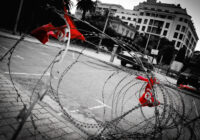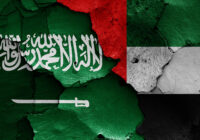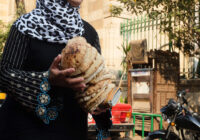The Qatar crisis has showed that size is no longer the only factor that determines a state’s ability to chart an independent course.
Food security has taken on a new dimension in the Qatar crisis. The standoff pits an Emirati-Saudi alliance against Qatar, and there appears to be no end in sight.
The United Arab Emirates and Saudi Arabia would deny that they are attempting to starve Qatar into submission. The diplomatic and economic boycott has forced the Qataris to seek alternative food suppliers and alternative air and sea shipment routes. Yet the de facto strategy by Abu Dhabi and Riyadh is to drive up the cost of Qatari food and other imports — to the point that Doha can no longer afford the more expensive imports.
In the process, the boycott has redefined the national security aspects of food security, particularly for small states that are more vulnerable to external pressure.
In the 2000s, food security for the Gulf Cooperation Council (GCC) meant ensuring access in a global market in which shortages were driving up prices. The GCC responded to the food crises and massive price hikes in 2007-08 and in 2010-11 by following in the footsteps of China, South Korea and Europe, and acquiring huge tracts of agricultural land in Asia and Africa.
Ironically, high oil prices were one driver of the increased cost of food that prompted some exporters in Africa and Asia — which were confronted with domestic shortages — to restrict exports. The restrictions were what prompted the GCC to go on its land acquisition binge.
At the time, food security for GCC states — which are cash-rich but soil-poor — was a question of market supply and demand, and ensuring the food supply chain at whatever price. That narrow definition first changed with the Arab Uprisings of 2011 that toppled long-standing autocrats, sparked civil wars and resulted in counterrevolutions. Some of those revolts, like in Syria, were prompted in part by droughts that affected the agricultural economy.
With the revolts, food security took on a far greater domestic security aspect for Gulf leaders, whose legitimacy is rooted in a social contract that promises a cradle-to-grave subsidized welfare state in exchange for surrendering all political rights.
IMPACT OF THE QATAR CRISIS
The Qatar crisis, however, has taken the dimensions of food security for the Gulf — as well as small states elsewhere — to a whole new level. Food security is no longer primarily about commercial or preferred access to world markets at times of shortages and rising prices. Control of agricultural resources in far-flung lands no longer provides necessary levels of security. The Qatar crisis has broadened the aim of food security, particularly for small states, to include a diversified supply, guaranteed shipping routes, and self-sufficiency up to a degree as a means of defense against attempts to starve a small state into submission.
The defense and security — as opposed to market aspects of food — have taken on additional significance not only because of Qatar’s need to fend off pressure on its food supplies by neighbors who are determined to undermine its independence.
 The most recent joint agricultural outlook — by the UN Food and Agriculture Organization (FAO) and the Organisation for Economic Cooperation and Development (OECD) — for the next 10 years suggests that the food crises of the 2000s are for now a thing of the past. “Prices for the main crops, livestock and fish products all fell in 2015, signalling that an era of high prices is quite likely over for all sub-sectors,” the outlook says.
The most recent joint agricultural outlook — by the UN Food and Agriculture Organization (FAO) and the Organisation for Economic Cooperation and Development (OECD) — for the next 10 years suggests that the food crises of the 2000s are for now a thing of the past. “Prices for the main crops, livestock and fish products all fell in 2015, signalling that an era of high prices is quite likely over for all sub-sectors,” the outlook says.
Food security is at the core of Qatar’s ability to resist Emirati-Saudi pressure. Its continued capability to do so will likely define perceptions about the margins of maneuverability that small states have in relationship to big brothers. “It sometimes takes war or the threat of war to make countries look at their food security,” John Dore, an Irishman who is helping Qatar become self-sufficient in dairy products, told The Guardian.
QATAR CRISIS MEANS IMPORTING FROM AFAR
To compensate for the effects of the Emirati-Saudi blocking of land, sea and air routes, Qatar initially shifted the bulk of its dairy imports from Saudi Arabia to Turkey and Iran. Trade between Qatar and Iran has increased by 60% percent since the imposition of the boycott in early June. The importing of thousands of cows from Europe and the US — Dore’s operation — within a matter of months means that Qatar has been able to supply up to 40% of its milk needs. Dore expects that the import of another 10,000 animals over the next year will make Qatar self-sufficient.
Indeed, Qatar’s enormous wealth has given it a leg up in its ability to fund resilience and its refusal to cave in to the demands of the UAE and Saudi Arabia. In doing so, it has relied not only on its financial muscle, but also on the relationships and dependencies it established by diversifying the client base for its liquefied natural gas.
Nonetheless, the long and short of Qatar’s fight is that how the battle in the Gulf unfolds and how the crisis is resolved will likely have far-reaching consequences for definitions of food security, priorities in shaping food security strategies, and the architecture of international relations. As small states gain confidence, they will recognize that size is no longer the only or main factor that determines their ability to chart an independent course.
The views expressed in this article are the author’s own and do not necessarily reflect Fair Observer’s editorial policy.
Photo Credit: Gil C / Shutterstock.com
Support Fair Observer
We rely on your support for our independence, diversity and quality.
For more than 10 years, Fair Observer has been free, fair and independent. No billionaire owns us, no advertisers control us. We are a reader-supported nonprofit. Unlike many other publications, we keep our content free for readers regardless of where they live or whether they can afford to pay. We have no paywalls and no ads.
In the post-truth era of fake news, echo chambers and filter bubbles, we publish a plurality of perspectives from around the world. Anyone can publish with us, but everyone goes through a rigorous editorial process. So, you get fact-checked, well-reasoned content instead of noise.
We publish 2,500+ voices from 90+ countries. We also conduct education and training programs
on subjects ranging from digital media and journalism to writing and critical thinking. This
doesn’t come cheap. Servers, editors, trainers and web developers cost
money.
Please consider supporting us on a regular basis as a recurring donor or a
sustaining member.
Will you support FO’s journalism?
We rely on your support for our independence, diversity and quality.







